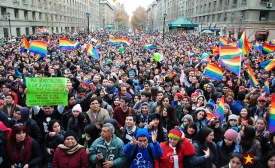human rights
“Human rights” can sound like an abstraction, something spoken of only at the highest levels of government. But the work governments do on human rights has consequences and can even make the difference between life and death. As we celebrate Human Rights Day on December 10, we look at how international campaigns in four human rights areas improved the lives of people around the world.
“Well-behaved women seldom make history” was first the title of an article written in 1975 by historian Laurel Thatcher Ulrich. [...] When looking at the role of women in the formulation of foreign policy, this phrase can also be relevant. The conclusions of a series of interviews with women who are foreign policy specialists overlap with what Ulrich wrote 40 years ago.
A return to basic local organizing practices may be in order for many human rights organizations. And at the same time, trends in technology, philanthropy, business and society present novel opportunities to improve human rights efforts that may enhance their impact, sustainability and resilience. Given the significance of the current threats, it is worth reconsidering the prevalent human rights “business model.”
The extent to which violence is embedded in society means that uprooting it is everyone’s job, senior United Nations official said today, lamenting that violence against women and girls continue to be a low priority on the international development agenda and urging more action – and more funding – to end the pandemic of such violence now, once and for all.
Efforts to leverage Qatar’s 2022 World Cup hosting rights to create the soft power the Gulf state needs to punch above its weight and ensure a sympathetic hearing in the international community in times of emergency operate on the Leninist principle of two steps forward, one step backwards.

Chile passed Latin America's first LGBT anti-discrimination law in 2012, but how has it fared in terms of social progess?
Over the past 10 years, many NGOs and human rights organisations on both sides of the Green Line, have started offering alternative tours of East Jerusalem, Palestine, and Israeli settlements inside the West Bank. These tours take tourists deep into conflict zones. They try to break negative stereotypes about Palestine as an unsafe place infested with terrorists by showing tourists the natural beauty, cultural wealth and hospitality of Palestine.
The United States will continue its assertive support for fundamental rights and will hold this UN body to the highest standards -- standards rooted in the bedrock values of our nation and the belief that international peace, security, and prosperity are strengthened when human rights and fundamental freedoms are respected and protected.







